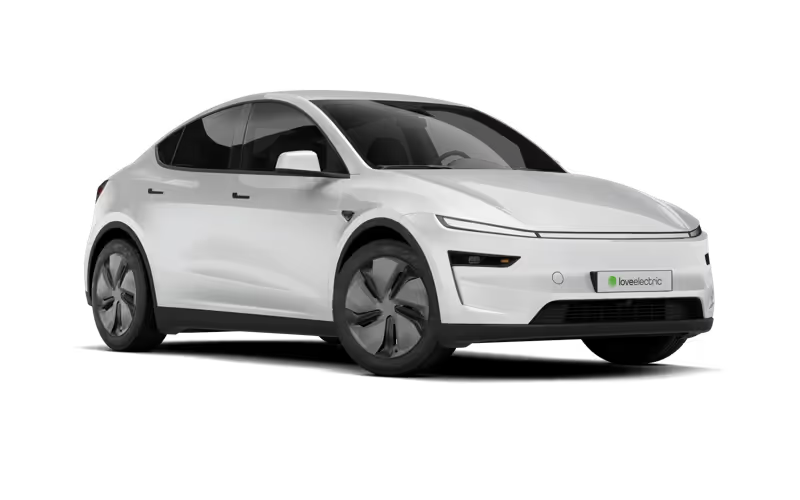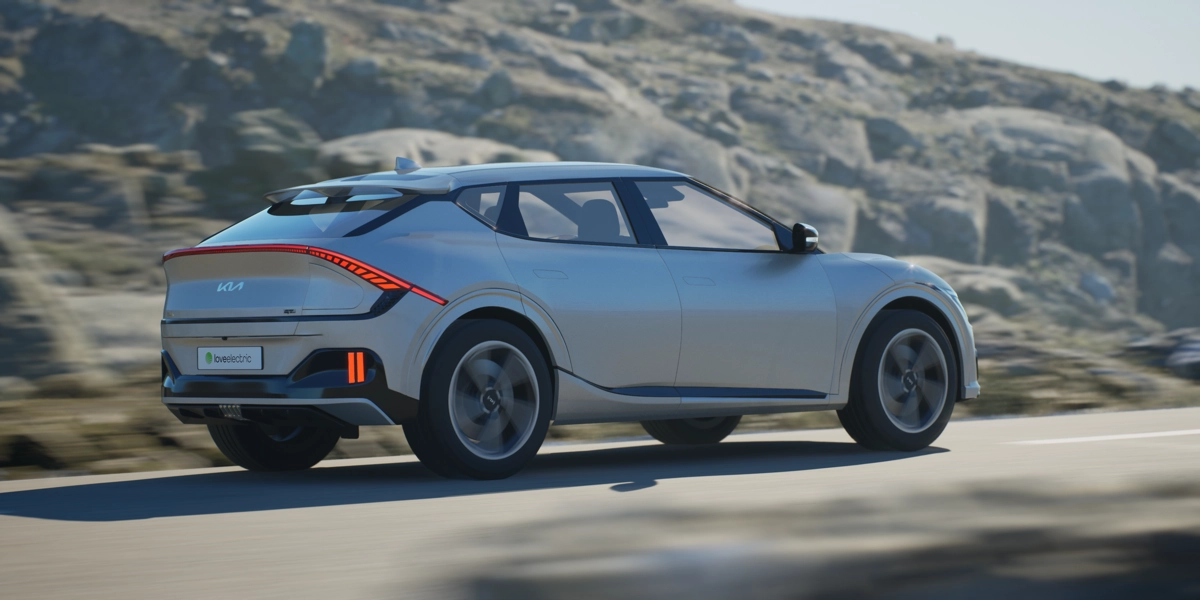Can You Buy a Car with Salary Sacrifice? Your Options

This article explains whether you can actually buy a car through salary sacrifice and outlines what options UK employees actually have.
So, can you buy a car with salary sacrifice?
No, salary sacrifice doesn’t let you buy a car outright.
Instead, it’s a lease-based benefit that allows you to drive a brand-new or used electric car for a fixed monthly amount, all paid directly from your gross salary before tax.
That distinction matters. When you buy a car, you own an asset. When you lease through salary sacrifice, you’re accessing a company-backed benefit that reduces your Income Tax and National Insurance contributions, making it a far cheaper way to drive an EV.
That said, some providers like loveelectric, are able to put in a request on your behalf to the funder for a purchase price. There are numerous customers who have bought the car outright at the end of their lease term - but this is not guaranteed.
Here's what an EV salary sacrifice scheme like loveelectric actually offers:
- Lease only: You pay monthly for vehicle use and ownership isn’t guaranteed
- Electric vehicles only: Most schemes focus on new EVs due to tax advantages
- Employer arrangement: Your company must offer the scheme as a workplace benefit
The confusion often stems from marketing that emphasizes "getting a car" rather than clarifying the leasing structure.
For a complete step-by-step guide on how the process works, see our detailed explanation on how salary sacrifice fr cars works.
Why salary sacrifice works as a lease
Salary sacrifice is designed as a tax-efficient employee benefit, not a financing method. The savings only apply because your salary is reduced before tax and National Insurance are calculated and HMRC rules restrict those savings to qualifying benefits like electric car leases, not outright purchases. So it simply cannot work if employees are buying the car through the scheme outright.
For some that’s a disappointment but for most, the leasing element actually works out in their favour. By leasing through salary sacrifice you get:
- Lower monthly costs through pre-tax deductions
- No large upfront deposit required. Although some providers like loveelectric, will offer the option of flexible deposits if you wish to bring the monthly lease cost down.
- Built-in flexibility to upgrade your vehicle at the end of the lease
For detailed information on tax savings, explore our guide to employee tax benefits for EV schemes.
Salary sacrifice vs buying a car: key considerations
If you’re deciding between buying a car outright or leasing one through salary sacrifice, the key differences come down to cost, ownership, and flexibility.
Which is cheaper in the long run?
Buying a car requires a large upfront payment, whether in cash or through finance. You’ll also face ongoing costs for insurance, servicing, tyres, MOTs, and depreciation (aka the value your car loses every year).
With salary sacrifice, there’s no deposit and far fewer surprise costs. Your monthly payment is taken from your gross salary, reducing what you pay in Income Tax and National Insurance.
Because of these tax savings and bundled extras, salary sacrifice is usually the cheaper option over a 2–4-year period, even though you don’t own the car.
Upfront costs at a glance:
- Buying: Typically 10-20% deposit plus monthly payments or full cash payment
- Salary sacrifice: No deposit, lower net monthly cost due to tax savings (though at lovelectric we do offer the option of a down payment to lower monthly salary deductions)
Total cost comparison over 3 years (£40,000 EV example):
Buying outright:
- Purchase price: £40,000
- Depreciation (40%): -£16,000 cost
- Insurance, servicing, maintenance, breakdown: £4,950
- Total cost: £20,950 (but you retain a £24,000 asset)
Salary sacrifice (£600/month gross lease):
- Basic rate taxpayer: £14,688 net cost (32% tax savings)
- Higher rate taxpayer: £12,528 net cost (42% tax savings)
- Includes everything: comprehensive insurance, servicing, maintenance, breakdown cover, tyres
- No asset retained, but no depreciation risk
While buying means retaining asset value, salary sacrifice costs £6,000-£8,000 less over three years with all running costs included. The key difference is whether you value the remaining asset or prefer lower total outlay with no hassle.
See our guide on salary sacrifice electric car prices for real examples across different EV models and salary bands.
Do you actually save more with salary sacrifice?
For most employees, yes. The savings depend on your tax band and income level, but because deductions happen before tax, higher-rate taxpayers can save the most.
Detailed savings breakdown (£500 monthly lease example):
Basic rate taxpayer (£12,570-£50,270 salary):
- Income tax saved: 20% = £100/month
- National Insurance saved: 8% = £40/month
- Total savings: 28% (£140/month)
- Net cost: £360/month
Higher rate taxpayer (£50,270-£125,140 salary):
- Income tax saved: 40% = £200/month
- National Insurance saved: 2% (on earnings above £50,270) = £10/month
- Total savings: 42% (£210/month)
- Net cost: £290/month
Important notes:
- You also pay Benefit-in-Kind (BIK) tax on the car value - 3% for EVs in 2025/26 and 4% in 2026/27.
- Employers also save on their National Insurance Contributions due to the reduced salary, making the scheme completely cost-neutral for companies.
All-inclusive package benefits: Monthly lease payments include everything you'd normally pay separately:
- Comprehensive insurance (typically £800-1,200/year)
- Annual servicing (£300-500/year)
- Breakdown cover (£150-200/year)
- Tyre replacement (£400-800 over 3 years)
- MOT and maintenance (£200-400/year)
These bundled costs typically total £2,000-£3,000 annually when arranged privately, but are included as part of the salary sacrifice package and monthly quote.
For a comprehensive analysis of whether these savings justify salary sacrifice for your circumstances, read our guide: Is EV salary sacrifice worth it?
Do you want to own the car?
If ownership is important, for example, you like the freedom to sell or modify your car, then buying is the only option. You’ll have an asset at the end, but also the burden of depreciation and maintenance.
Let’s look at the benefits of each option:
Buying benefits
- Full ownership and asset value retention
- Freedom to modify or sell anytime
- No mileage restrictions
- Potential for equity if vehicle holds value well
Salary sacrifice benefits
- Lease-only but able to upgrade more frequently
- Change vehicles every 1-4 years without depreciation concerns
- Access to newer technology and safety features
Do you want EV-specific benefits?
Because EVs have very low Benefit-in-Kind (BIK) tax rates, they’re uniquely suited to a salary sacrifice scheme. It’s just 3% for EVs in 2025/26, with it rising to 4% in 2026/27.
So with EV salary sacrifice, drivers benefit from huge tax efficiencies that simply don’t exist when buying outright.
In contrast, purchasing an EV personally gives you no tax advantage — you pay VAT, road tax (after 2025), and cover all running costs yourself. Plus, depreciation is currently very steep for EVs.
For the most comprehensive scheme options, explore our guide to the best salary sacrifice car scheme providers.
What types of cars can you get on salary sacrifice with loveelectric?
From compact city runarounds to premium SUVs, our platform connects employees to one of the UK’s widest ranges of EVs, all available through salary sacrifice.
And unlike most providers, we also include Reloved® used EVs, opening the door for more people to drive electric for less.
The below is all just a snapshot at what’s available through loveelectric’s salary sacrifice scheme.
Small city EVs
Ideal for short commutes and urban driving, these models combine low running costs with easy charging and compact design. Think MINI Electric, Renault 5 or Vauxhall Corsa-e.

They all offer premium comfort at a fraction of the price when leased through salary sacrifice.
These cars are perfect for employees on mid or lower salaries who still want the benefits of EV ownership without high monthly costs.
Family SUVs
Need space for passengers, luggage, or weekend adventures? Electric SUVs like the Kia Niro EV or Hyundai Kona balance comfort, range, and practicality.

Through salary sacrifice, these models can cost 30–60% less per month than personal leasing, and all maintenance is covered.
Premium & performance EVs
For those who want something special, premium EVs such as the Tesla Model Y or BMW iX are available too.

Thanks to low Benefit-in-Kind (BIK) rates, even higher-end models can be surprisingly affordable under salary sacrifice, especially for higher-rate taxpayers.
Reloved® used EVs
Our unique Reloved programme provides access to quality used electric vehicles. Here’s how it works:
- Previously leased vehicles: Cars are returned from completed lease terms, so no car is older than 48m.
- Professional refurbishment: Each car is fully inspected and reconditioned - only the highest quality vehicles go back out for leasing.
- Same all-inclusive package: Insurance, servicing and breakdown cover are included for both new and used vehicles
- Lower monthly costs: Due to their age, savings are significantly more than compared to new EVs
- 1,000+ delivered: Proven track record with over 1,000 Reloved vehicles delivered
loveelectric provides one of the UK's widest EV selections available through salary sacrifice, combining new vehicle choice with unique used car access.
Making your choice
Your decision between buying outright and salary sacrifice depends on your priorities and financial situation.
You should choose to buy a car outright if you:
- Want to own your vehicle and hold an asset
- Travel a huge amount every year and require no mileage restrictions
- Plan to keep the car for many years
- Don't mind higher upfront costs and risk of depreciation
You should choose salary sacrifice if you:
- Want lower net monthly costs and a lower tax bill
- Prefer an all-inclusive package and complete peace-of-mind
- Like upgrading to newer vehicles regularly
- Want access to EVs you might not otherwise be able to afford
Bottom line: For most UK employees, salary sacrifice with loveelectric offers the most affordable and flexible way to drive an electric vehicle.
For step-by-step guidance on getting started, read our guide: How to get a car on salary sacrifice.
Get the car you want for a price you love with loveelectric
loveelectric combines the UK's widest EV selection with industry-leading customer service and competitive pricing.
What loveelectric offers:
- New and used EV options
- 30-60% monthly savings vs private leasing
- No deposit required
- Optional flexible deposits available to reduce monthly lease cost
- All-inclusive package including insurance, servicing, and breakdown
Check your eligibility or refer your company to access our scheme.
Buy a car with salary sacrifice FAQs
Can I buy a second-hand car on salary sacrifice?
Most schemes: No. Traditional salary sacrifice providers focus exclusively on new vehicles.
loveelectric: Potentially. At the end of a lease, loveelectric are able to put in a request on your behalf to the funder for a purchase price - this is not guaranteed though.
Do you own the car at the end of a salary sacrifice scheme?
No, salary sacrifice schemes do not guarantee vehicle ownership. However, purchase options may occasionally become available, though this should never be assumed when entering the agreement.
Standard lease end options:
- Return the vehicle and choose a new one
- Extend the current lease term
- End the arrangement by handing the car back
Potential buyout option: Some providers, including loveelectric, may occasionally negotiate buyout prices with their leasing partners. However, this is:
- Not guaranteed at the start of any lease
- Subject to leasing partner approval
- Typically offered as a separate transaction
- Never a contractual right within the salary sacrifice arrangement
Important: You should enter salary sacrifice assuming you will not own the vehicle, as purchase options are exceptional rather than standard.
Is it cheaper to buy or salary sacrifice an EV?
Salary sacrifice is typically cheaper for most employees due to the high tax savings. A higher-rate taxpayer may save up to 60% on monthly costs compared to private purchase or lease options. However, buying provides asset ownership while salary sacrifice offers only vehicle access.
Your choice depends on whether you prioritise lower costs or asset ownership.
Why can’t you buy a car with salary sacrifice?
Salary sacrifice is a tax-efficient leasing benefit, not a purchase scheme. The savings come from reducing your gross salary before tax, which only applies to approved benefits, such as electric car leases, not asset purchases.
In other words, the structure is designed for leasing, not buying. If you bought the car outright, you’d lose the tax and National Insurance advantages that make salary sacrifice so affordable.


.jpg)


